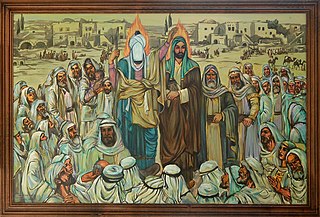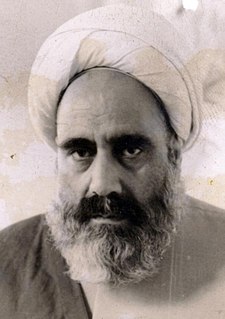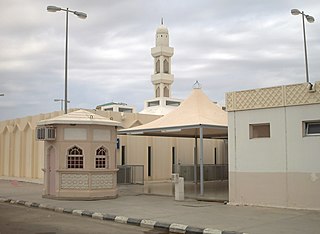Related Research Articles

Companions of the Prophet or aṣ-ṣaḥābah were the disciples and followers of Muhammad who "saw or met the prophet during his lifetime and were physically in his presence". "Al-ṣaḥābah" is definite plural; the indefinite singular is masculine صَحَابِيٌّ, feminine صَحَابِيَّةٌ.

The succession to Muhammad is the central issue that split the Muslim community into several divisions in the first century of Islamic history, with the most prominent among these sects being the Shia and Sunni branches of Islam. Shia Islam holds that Ali ibn Abi Talib was the appointed successor to the Islamic prophet Muhammad as head of the community. Sunni Islam maintains Abu Bakr to be the first leader after Muhammad on the basis of election.
The Hadith al-Thaqalayn, also known as the Hadith of the two weighty things, refers to a saying (hadith) of the Islamic prophet Muhammad. According to the hadith of Muhammad, the Qur'an and Ahl al-Bayt had been described as the two weighty things. In the context of this Hadith, Muhammad's family refers to Ali ibn Abi Talib, Fatimah bint Muhammad, and their children and descendants. This hadith is accepted by Shia and Sunni Islam.
Jabir ibn Abdullah ibn Amr ibn Haram al-Ansari was a prominent companion of the Islamic prophet Muhammad.

The event of Ghadir Khumm refers to a sermon delivered by the Islamic prophet Muhammad at the Pond of Khumm, shortly before his death in 632 CE. According to Shi'ite traditions, in the sermon Muhammad announced Ali ibn Abi Talib as his successor, after which the final verse of the Quran was revealed, proclaiming the perfection of the religion of Islam. The day's anniversary in the Islamic calendar is celebrated by Shi'ite Muslims as Eid al-Ghadir.
The hadith of the twelve successors, or twelve caliphs is an Islamic prophecy, attributed to Muhammad. It is most popular among Twelver Shi'ites, as they interpret the prophecy was fulfilled by the Twelve Imams. The hadith is widely accepted by all Muslims, but its interpretation varies heavily.
Abu 'Abd Allah Muhammad ibn Muhammad ibn al-Nu'man al-'Ukbari al-Baghdadi, known as al-Shaykh al-Mufid and Ibn al-Mu'allim, was a prominent Twelver Shia theologian. His father was a teacher (mu'allim), hence the name Ibn al-Mu'allim. The title "al-Mufid" was given to him either by Muhammad al-Mahdi, the twelfth Shia Imam, or by al-Rummani, a Sunni scholar, after a conversation with him. The leader of the Shia community, he was a mutakallim, theologian, and Shia jurist.
‘Ala al-Din ‘Ali ibn ‘Abd-al-Malik Husam al-Din al-Muttaqi al-Hindi was a Sunni Islamic scholar who is known for writing Kanz al-Ummal.
Sulaym ibn Qays al-Hilali al-Amiri was one of the Tabi‘un and a companion of Ali towards the end of the latter's life. Sulaym was also a loyal companion of Ali's sons Hasan and Husayn, the latter's son Ali Zayn al-'Abidin, and Muhammad al-Baqir. He authored the well-known book, Kitab Sulaym ibn Qays.

Al-Mu'ayyad fid-din Abu Nasr Hibat Allah b. Abi 'Imran Musa b. Da'ud ash-Shirazi was an 11th-century Isma'ili scholar, philosopher-poet, preacher and theologian of Persian origin. He served the Fatimid Caliph-Imām al-Mustansir Billah as a Da'i in varying capacities, eventually attaining the highest rank of Bab al-Abwab "The Gate of Gates" and Da'i al-du'at "Chief Missionary" in the Fatimid Da‘wah. In his theological and philosophical writings he brought the Isma'ili spiritual heritage to its pinnacle.
Ali bin Ahmad al-Samhudi was a Sunni Shafi'i Islamic scholar.
Ghadir means hollow or pond in Arabic. It may refer to:
Sayf ibn Umar al-Usayyidi al-Tamimi was an early Islamic historian and compiler of reports who lived in Kufa. He wrote Kitāb al-futūh al-kabīr wa 'l-ridda, which is al-Tabari's main source for the Ridda wars and early Muslim conquests. It also contains important information on the structure of early Muslim armies and government. According to al-Dhahabi, Sayf died during the reign of Harun al-Rashid (786-809).

Al Ghadir is a 20-volume book written by the Iranian Shia scholar Abd Al Husayn Amini.

The Imamate in Nizari Isma'ili doctrine is a concept in Nizari Isma'ilism which defines the political, religious and spiritual dimensions of authority concerning Islamic leadership over the nation of believers. The primary function of the Imamate is to establish an institution between an Imam who is present and living in the world and his following whereby each are granted rights and responsibilities.

Sheikh Abdul Hossein Amini was a Shia scholar, traditionist, theologian and jurist. His magnum opus is Al-Ḡadīr fi’l-Ketāb wa’l-Sonna wa’l-Adab.
The Hadith of the Ark is a tradition narrated from the Islamic prophet Muhammad by different narrators such as Ali ibn Abu Talib, Abu Dharr al-Ghifari and Ibn Abbas. In this tradition, Muhammad compares his household to Noah's ark, the only way to salvation in a sea of darkness, deviations, innovations and passions. Both Shi'a and Sunni scholars agree that prophet narrated this hadith. According to Shia Islam, the Twelve Imams are the Ulu'l-Amr, who are like the ark of Noah, where Quran 33:33 and Hadith al-Thaqalayn refers to them.

The Āyat Ikmāl ad-Dīn is the third verse of Surah Al-Ma'idah in the Quran (Q5:3). In this verse God (Allah) says that he had perfected the religion and completed the blessing. According to Sunni Muslims, the verse was revealed on the day of Arafah during the Farewell Pilgrimage. Shia Muslims meanwhile believe that it was revealed during the Event of Ghadir Khumm.
Seyyed Hashem Bahrani, was born between years 1620 to 1630. His father is Soleyman ibn Esmaeel Bahrani Tubeli Katkatani and their ancestry reach to Musa ibn Ja'far.

Eid al-Ghadir is a Shia feast, and is considered to be among the "significant" feasts of Shia Islam. The Eid is held on 18 Dhu Al-Hijjah at the time when the Islamic prophet Muhammad was said to have appointed Ali ibn Abi Talib as his successor. According to hadiths, this Eid has been named "Eid-e Bozorg-e Elāhi", "Eid Ahl al-Bayt Muhammad" and Ashraf al-A'yaad.
References
- ↑ "Ghadir Khumm: Comments by scholars which mention the presence of books dedicated to the event of Ghadir Khumm". Archived from the original on 2016-03-03. Retrieved 2006-09-27.
- ↑ arabic_reference_works.html
- ↑ Sakeenah: Luminaries
- ↑ Dictionary of Muslim Saints